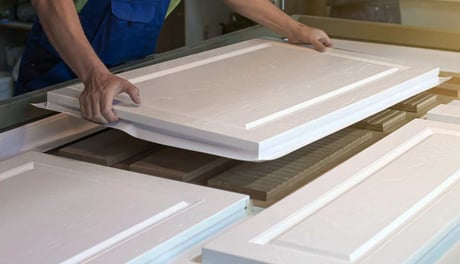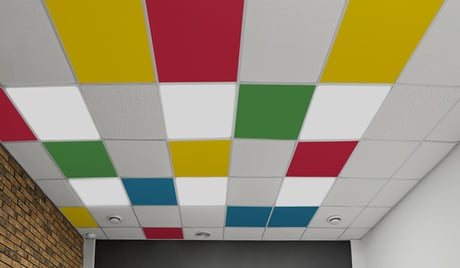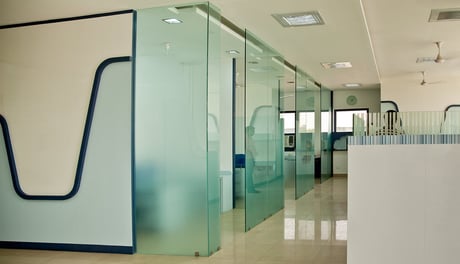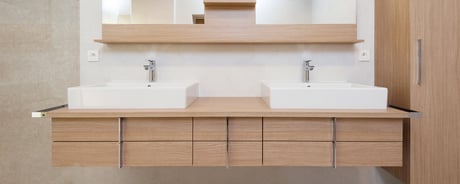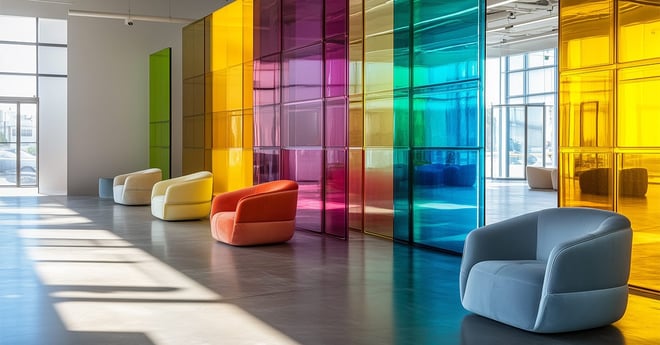
When it comes to finishing processes, glass coating machinery meets a wide range of needs. These needs may be purely aesthetic or functional. And it's on the basis of this distinction that the right choices need to be made, allowing you to build a line that’s consistent with your market goals and the field of use. Glass finishing processes are used in numerous sectors, such as furniture, construction and solar panels.
Glass processing and finishing machinery
At Cefla Finishing, we understand that each case requires solutions with specific characteristics: that’s why we’ve developed a comprehensive glass coating machinery range. By drawing on extensive experience with leading players in several key industries, we’ve created a series of solutions that can easily be integrated with other machines on existing chains. These include all the tools and functions needed to customise the machines and fine-tune procedures that respond to the needs of the specific industry.
Let's look at some of the machines in today’s Cefla range:
Prima Glass: flexible and easy to use
Let’s start with Prima Glass, an automatic spraying machine. An outstanding glass processing solution on account of its extreme flexibility, this machine can apply low or high quantities of materials. Providing the advantages of fast colour changeovers and low coating consumption, it’s also extremely user-friendly, even for inexperienced operators.
Multicoater & Glasscoater: high productivity and high precision
The Multicoater & Glasscoater combination provides an integrated roller coating solution that can also give glass a frosted or acid-etched effect; it can also be used to apply coloured coatings to produce spandrel glass. The machine delivers clean post-coating edges and combines uniformity of application with high productivity.
Framecoater: ideal for processing frameless panes
Framecoater, instead, is a roller coating machine for processing edges by applying perimeter bands on the pane; again, the machine lets manufacturers obtain perfectly clean post-treatment edges. Used on frameless panes to mask silicone and sealants, it provides the best uniformity of application in its category.
Solarcoater: for those who want an uncompromising finish on anti-reflective glass
For operators in the anti-reflective glass finishing sector who are unwilling to compromise on quality, Cefla Finishing has now created Solarcoater, a specialized nanometric roller coating machine. In addition to providing an anti-reflective effect, the machine can also give the glass an anti-fingerprint and anti-drip effect.
THE MOST INNOVATIVE FINISHING SOLUTIONS
Discover how highly advanced finishing solutions can elevate your competitiveness.
Benefits of using glass finishing machinery
One of the most interesting benefits of Cefla glass processing machinery is the significant improvement in product quality. More specifically, automated systems provide excellent precision and consistency, minimising the human errors that are often responsible for imperfections in the final product and minimising production of industrial waste.
Processes such as polishing, coating and finishing are performed under ideal conditions and according to optimal parameters, ensuring each product meets the strictest quality standards. This not only boosts customer satisfaction: it also reduces the likelihood of product recalls due to defects.
Improved aesthetics
Thanks to even application of the finish, the glass takes on a more elegant, refined appearance, making it easier to match with other materials: a crucial aspect in a multitude of sectors that range from construction to automotive and design.
Greater durability
Applying a specific finishing layer to glass makes it more resistant to scratching, impact and weather while ensuring it maintains (and, in many cases, emphasising) the aesthetic appeal of the original material.
Greater versatility
Glass panes that have undergone meticulous processing can subsequently be used in a broad range of fields, with applications capable of satisfying even the most demanding clients, such as those in the aerospace or photovoltaic sectors.
Lower costs
Automating the glass finishing process ultimately leads to significantly lower costs, especially in the long term. Note also that automated systems minimise manual labour requirements and allow workers to be reallocated to high-added-value tasks.
What’s more, automated machinery works fast and efficiently, raising output rates without sacrificing quality. The outcome is lower energy costs per unit produced and, in many cases, lower raw material requirements. This is because the machinery is able to optimise resource use at each stage of the process.
Innovations in glass processing machinery
Lastly, it should be remembered that choosing the right glass processing machinery can make innovation the focus of company strategy. Cefla Finishing, for example, continues to develop solutions that meet the needs of companies looking to unleash the full potential of digital printing and 4.0 technology which, thanks to data analysis, allow real-time monitoring and adjustment of the finishing process.
By leveraging advanced solutions such as predictive analytics and material control systems, manufacturers can better predict demand and fine-tune production to reduce excess inventory and waste. This is just one of many advantages on offer.
Choosing Cefla Finishing as a technological partner doesn’t just mean activating a supply contract with an international finishing machine leader: above all, it means implementing an upgrowth strategy that puts innovation, efficiency and sustainability at the forefront of process development.
LOOKING FOR THE IDEAL COATING LINE SOLUTION?







